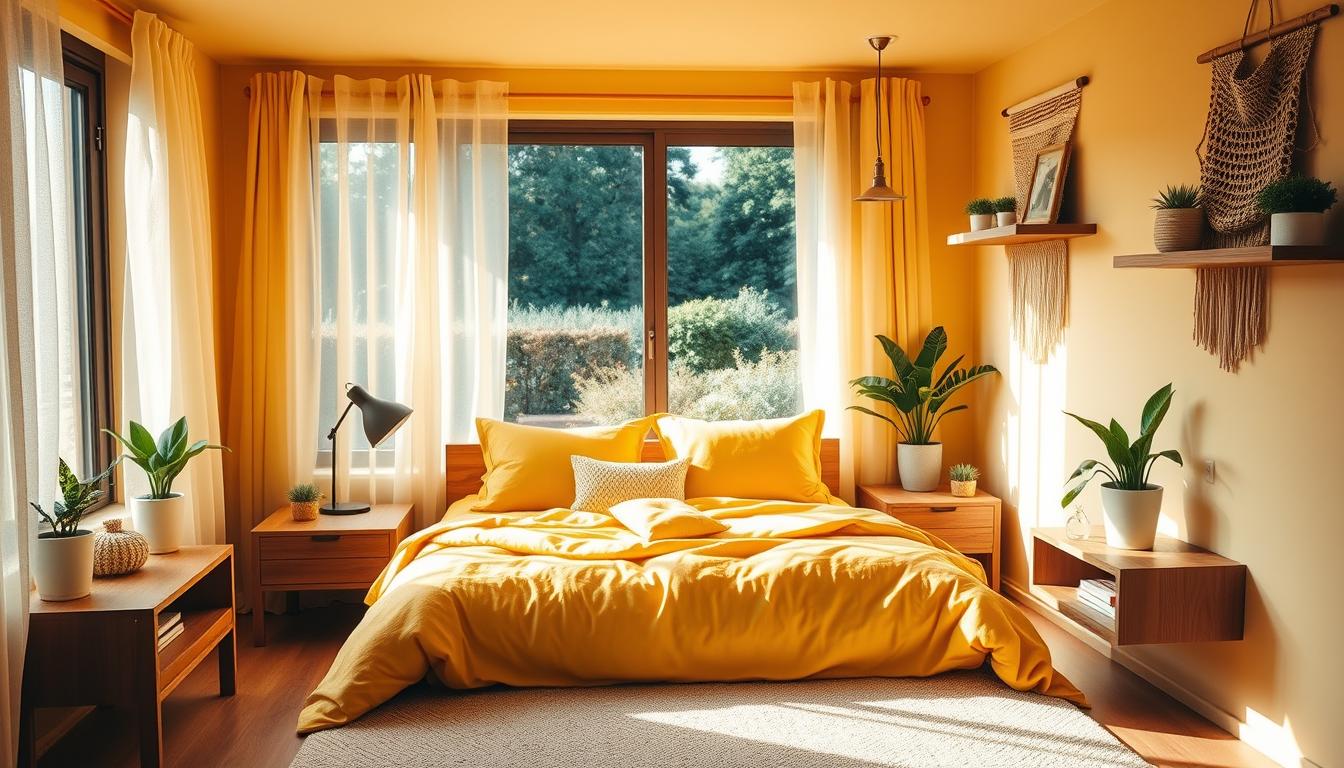Here’s a shocker: 68% of homeowners who choose yellow for their bedrooms end up repainting within two years. Why? Because this sunny color can turn from cheerful to chaotic faster than you can say “butter walls.”
Yellow is like a golden retriever — enthusiastic, happy, and full of energy. But, it can overwhelm your bedroom quickly. The secret isn’t avoiding this vibrant hue altogether.
It’s about mastering the art of restraint. This guide shows how to use yellow’s mood-boosting magic without overwhelming your space. You’ll learn why layering different shades of yellow is better than using one bold tone.
We’re talking real-world strategies that fit your budget. No Pinterest-perfect rooms that nobody actually sleeps in.
Key Takeaways
- Yellow works best when used in measured doses instead of being the main color
- Layering multiple yellow tones creates depth without visual chaos
- Natural materials like rattan and linen help balance yellow’s intensity
- The 60-30-10 color rule prevents any single hue from taking over
- Proper lighting dramatically affects how yellow appears throughout the day
- Texture and pattern mixing adds sophistication to yellow room designs
Understanding Yellow’s Impact in Bedroom Design
Yellow in bedroom design is more than looks. It’s a tool that affects your sleep. It changes how your brain sees your space, affecting your energy and sleep.
Knowing color psychology in interior design is key. The right yellow can make you feel sunny. The wrong one might keep you awake.
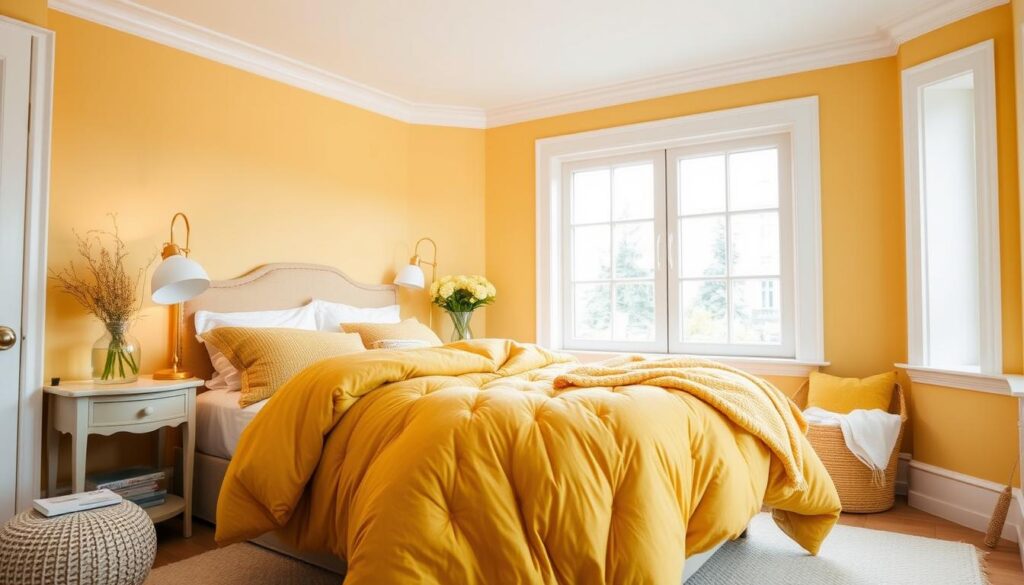
The Psychology of Yellow in Interior Spaces
Yellow makes you happy by activating your brain’s happiness centers. It’s like a built-in mood elevator on your walls. It boosts mental clarity and creativity, great for kitchens and offices.
But, yellow can be too much for bedrooms. It might keep you awake instead of sleepy.
Yellow affects your brain’s alertness and thinking. Your body’s natural sleep cycle can get mixed up. Color psychology in interior design says bedrooms need calm colors.
Different Shades and Their Effects on Mood
Not all yellows are the same in bedrooms. Soft yellows and creams are sunny but calm. They’re like a gentle sunrise for your room.
Pale yellow makes your room feel cheerful but not too much. It keeps your senses calm at night. These colors are good for your mood but also for sleep.
Bright yellows are too much for bedrooms. They’re too energizing. Golden yellows are better. They’re warm and cozy, but also calm for sleep.
How to Style a Yellow Bedroom Without Overwhelming the Space
Mastering yellow bedroom styling is about knowing when to add drama and when to hold back. The trick is not to avoid yellow but to use it wisely. Smart yellow bedroom decor adds warmth without making the space feel too busy. It’s easier than you think.
Your bedroom is like a conversation between colors. If yellow is everywhere, it’s like someone yelling. But with the right colors, yellow becomes the friendly guest that makes everyone feel at home.

The 60-30-10 Color Rule for Yellow Bedrooms
Here’s a game-changing formula: the 60-30-10 rule makes spaces feel calm. Use 60% of the room for a dominant color like soft whites or warm grays. This goes for walls and big furniture.
Yellow gets 30% of the room. This could be yellow bedding, curtains, or an accent wall. The last 10% is for bold pieces like bright yellow pillows or art.
This way, yellow adds fun without being too much. Minimalist bedroom styling works well with this balance, creating interest without feeling too busy.
Choosing the Right Yellow Shade for Your Space
Not all yellows are the same, and your choice is key. Avoid super bright yellows that are too loud. Instead, choose sophisticated buttercream hues like Benjamin Moore’s America’s Heartland.
Muted yellows, like buttery or mustard, are welcoming. They add elegance without being too loud. They make a room feel energizing, not exhausting.
Think about your room’s natural light too. North-facing rooms do well with warm yellows. South-facing rooms can handle cooler, more subtle shades.
Creating Visual Balance with Neutral Anchors
Neutral colors are like steady friends that keep your yellow decor in check. Warm grays, soft whites, and gentle beiges help yellow stand out without feeling too much.
Neutrals are like pauses in music. They give your eyes a break. A white duvet with yellow pillows is perfect. Yellow walls with gray furniture create a nice contrast.
The magic is when every color gets to be heard without fighting. This balance between yellow and neutrals turns overwhelming spaces into cozy places that help you sleep better.
Strategic Wall Treatment and Paint Techniques
How you treat your walls makes your yellow bedroom feel special or too much. It’s all about strategy and style. Some people get it right, while others don’t.
Wall treatment is like the base of your design. If you get it right, everything else will look good. But if you mess up, even the best furniture won’t help.
Accent Wall vs. Full Room Coverage
The accent wall approach is like wearing a bold necklace. It catches the eye without being too much. Pick the wall behind your headboard for the best effect.
Painting just one area can make a big statement. Frame a fireplace or use picture rails in a bright color. This makes a special spot in your room.
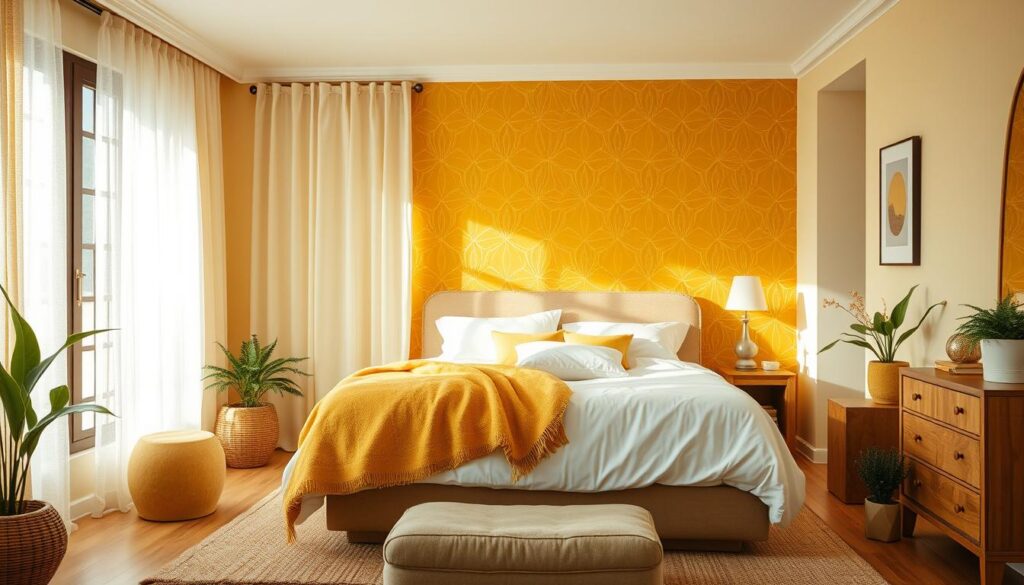
But sometimes, painting everything the same color is the best choice. Yellow walls, trim, and ceiling create a cozy feel. This bold move adds elegance to your room.
Paint walls a calm color and add yellow for a fun touch. This creative idea can make your room stand out.
Texture and Finish Options for Yellow Walls
Texture is key with yellow walls. The right finish can make your room look amazing.
A matte finish is modern and adds depth. Eggshell adds warmth without being too shiny. Your bedroom won’t look like a fast-food place.
Satin is great for rooms with lots of light. It gives a soft glow that changes with the day. This adds interest to your room.
Pro tip: Test paint in different lights before you decide. That perfect yellow might look bad at night. Try paint on different walls and see how it looks at different times.
Lighting Solutions That Complement Yellow Decor
Yellow can be too bold without the right lighting. It needs light to shine and make your room warm and lively. The right lighting turns yellow into a powerful tool for your bedroom.
Light sources affect yellow in different ways. Natural light makes yellow bright, but bad artificial light can dull it. Using bedroom lighting techniques helps create a lively and interesting space.
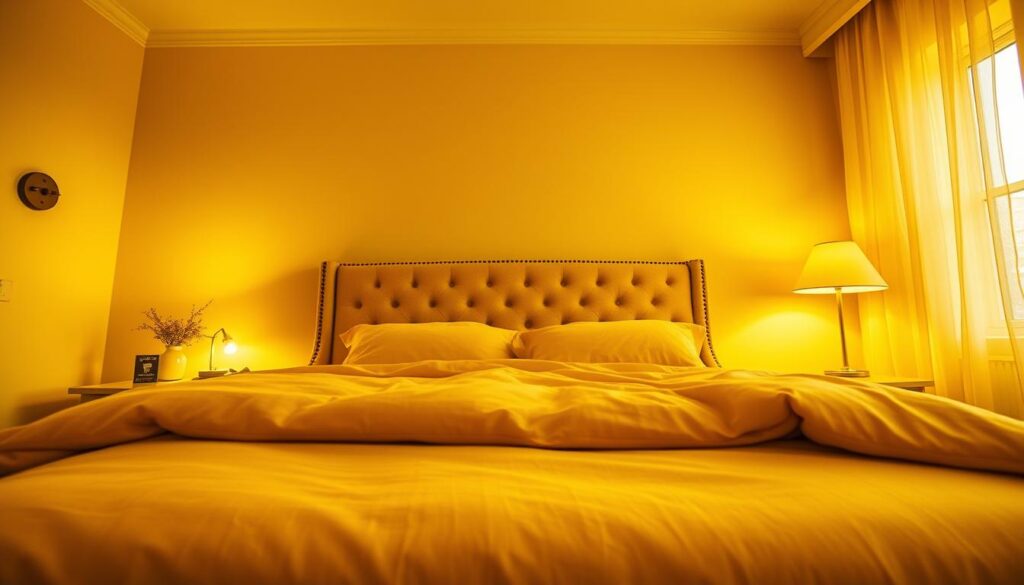
Natural Light Optimization Techniques
Natural light is yellow’s best friend. It makes yellow look rich and inviting. If you have great windows, use sheer curtains to let in light without blocking it.
Place mirrors to bounce light around the room. A mirror can make your light sources work harder. Use reflective surfaces to brighten your room all day.
Artificial Lighting Temperature and Placement
Choosing the right artificial lighting is key. Warm lighting (2700K-3000K) makes yellow cozy. Cool lighting can make it look cold. Task lighting on both sides of the bed helps with reading at night.
Stay away from harsh overhead lights. They create bad shadows. Instead, use soft ceiling lights for even light. This keeps yellow warm and inviting.
Layered Lighting Approach for Yellow Bedrooms
Yellow bedrooms need a three-tier lighting plan. Start with ambient light, add task light, and finish with accent light. This keeps the color balanced.
Soft lighting all day long feels like the golden hour. Table lamps add warm pools of light. This way, your yellow bedroom feels welcoming, not too bright.
Furniture and Textile Selection for Harmony
Choosing the right furniture and textiles is key to a stunning yellow bedroom. It’s your chance to create calming bedroom vibes that feel special. The trick is to make colors talk to each other, not fight.
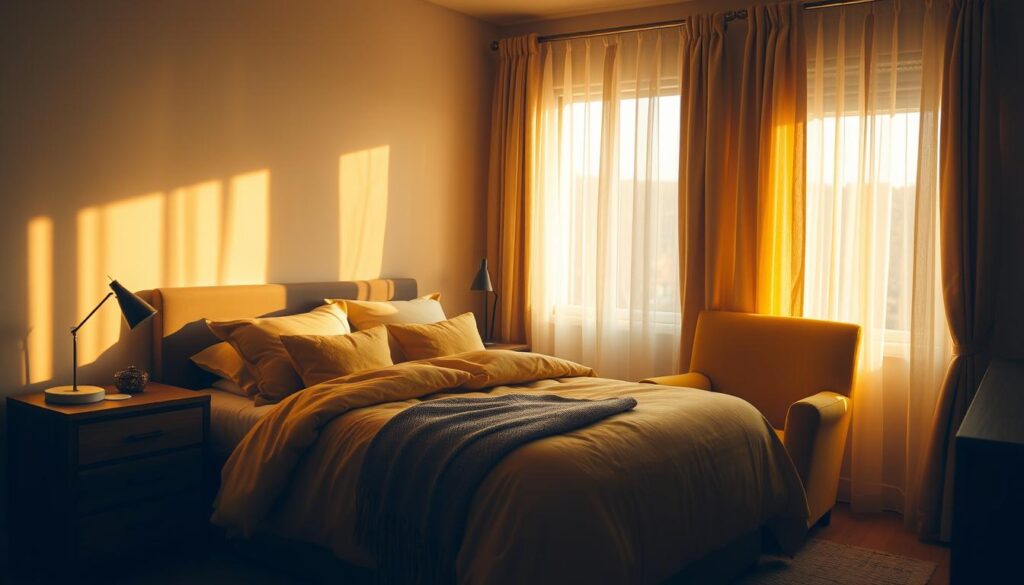
Choosing Complementary Furniture Colors
Dark wood pieces like walnut or cherry make yellow walls pop. They add depth and make your space feel fancy. White or cream furniture keeps things light and airy, perfect for a sunny feel.
Here’s a secret: don’t match everything. Yellow looks great with earthy tones like olive green or brown. Golden yellow, coral, and baby blue are a winning combo.
Mixing textures and materials adds depth that looks great in photos and feels amazing. Yellow works well with cool colors like blues, lavenders, greens, and grays.
Bedding and Curtain Coordination Strategies
Start with crisp white sheets for a yellow room. They make yellow look more expensive and timeless.
Add a textured throw in a neutral color, then pillows in accent colors. This creates a cozy bedroom ambiance while keeping things stylish.
For curtains, pick fabrics that match or contrast your yellow. Textured elements like woven throws or tufted cushions add interest without overwhelming the space.
Incorporating Patterns Without Visual Chaos
Patterns are great, but pick one dominant pattern. A yellow floral wallpaper behind the bed works well with solid textiles.
Geometric yellow pillows can handle more patterns because they bring order. You want your space to feel put together, not messy.
Keep it simple: if your walls have patterns, use solid textiles. If your textiles have patterns, keep walls simple. This balance makes your bedroom cozy for Sunday coffee and stylish for friends.
Conclusion
Your yellow bedroom journey doesn’t stop with picking the right shade. It’s about seeing how all parts come together. This creates a space that feels full of energy but not too much.
Yellow is very flexible. You can pick soft butter tones for calm or bold sunflower hues for energy. The important thing is to keep things balanced. Use yellow as an accent color to add warmth and personality.
Your bedroom should show off your style and help you rest and feel energized. Trust your gut when mixing textures and choosing lighting. The 60-30-10 rule helps make your space feel planned, not random.
Yellow is more than just a color; it’s a daily boost of hope in your home. With these tips, you can make a bedroom that always makes you happy.
